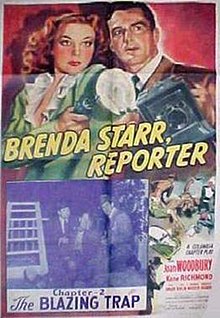Brenda Starr, Reporter (film)
| Brenda Starr, Reporter | |
|---|---|
 |
|
| Directed by | Wallace Fox |
| Produced by | Sam Katzman |
| Written by |
Ande Lamb Dale Messick George H. Plympton |
| Starring |
Joan Woodbury Kane Richmond Syd Saylor Joe Devlin Wheeler Oakman |
| Music by | Edward J. Kay |
| Cinematography | Ira H. Morgan |
| Edited by | Charles Henkel Jr. |
| Distributed by | Columbia Pictures |
|
Release date
|
|
|
Running time
|
13 chapters 243 minutes |
| Country | United States |
| Language | English |
Brenda Starr, Reporter (1945) was the 25th film serial released by Columbia Pictures. It was inspired by Brenda Starr, Reporter, a popular comic strip created by Dale Messick. The title role was played by Joan Woodbury, who had similar roles in feature films for Columbia and Monogram.
Daily Flash newspaper journalist Brenda Starr (Joan Woodbury), and her photographer, Chuck Allen (Syd Saylor), assigned to cover a fire in an old house where they discover the wounded Joe Heller (Wheeler Oakman),a mobster suspected of stealing a quarter-million dollar payroll. The dying Heller tells Brenda that someone took his satchel of stolen money and he gives her a coded message. Kruger (Jack Ingram), the gangster who shot Heller, escapes to his gang's hideout with the bag but discovers it is filled with paper rather than money. The gang, knowing Heller gave Brenda a coded message makes many attempts on her life to get her to reveal where Heller hid the payroll money. But thanks to Chuck and Police Lieutenant Larry Farrel (Kane Richmond), she evades them, until Pesky (William 'Billy' Benedict), a Daily Flash office boy succeeds in decoding the Heller message.
Joan Woodbury later recalled:
It was made during the war and everybody was hungry, including me. My former husband had gone off to war. I was left with a little daughter. So you grabbed anything you could grab and, believe me, you were very grateful for anything that came along. This was a 13 episode thing, in 21 days! The only reason they gave me the role was the fact I could learn dialogue fast enough to do everything in one take. The most memorable thing is, on the last night, the back of the set was one solid bar and there wasn’t an inch of space between one bottle and the next. Everybody was waiting for the wrap-up, so we could have a party! But I had 19 pages of dialogue on a telephone, with nobody talking back to me. It’s great if an actor talks back, you can at least ad lib on his ad libs. When you have nobody talking back, you’ve got nobody to ad lib you. So I’d look at a page and say, ‘Okay, let’s do it,’ pick up the phone and we’d shoot it. I shot all 19 sequences in one take, because they were going to kill me if I didn’t, with all that booze waiting; and I proceeded to get bombed after that. (Laughs) Sam, at least, realized it was cheaper to hire a stuntlady than break my leg. So I didn’t fall out of windows…I didn’t have any fun at all. (Laughs) I didn’t care to do any more serials.
...
Wikipedia
